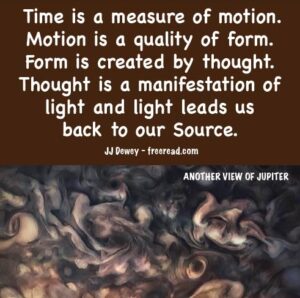
The Principle of Time
Questions on Time:
What is time and the principle behind it?
What is the difference between time and timelessness?
What’s the relation between time and consciousness?
Time is motion in the worlds if form and the rate at which time passes is determined by the rate of conscious perception. The reason our smallest standard unit of measurement of time is a second is because it takes about a second for the average person to register an event in his consciousness. Now we can perceive an event that takes place in as little as about a 64th of a second, but it still takes about a second to register it in our waking consciousness.
In other words, one cannot see 64 images in one second and register them all in that second. We can generally only register one.
But let us suppose that you could register 64 images in one second. Because your consciousness sped up time would slow down. What would seem like a moment to a regular human would seem like over an hour in your quickened state.
The sped-up state does not represent higher consciousness but usually lower consciousness. For instance, have you notice how little lives seem to react very quickly? When you spot a mouse and it flees it reacts quicker than any human. Then watch the insect world. They react exceedingly fast. The reason is that they are registering events quicker than we are and consequently live in a different time reality.
The heartbeat of a living organism is very closely linked with time. The faster the heart rate the more rapidly time passes, but this has the effect of making an hour or a minute seem longer.
You can experiment with yourself on this. Rest for five minutes and read a book or watch TV. Because you are at rest your heart rate will be slow and time will proceed at a normal pace. Now go run for five minutes and get your heart rate up to double speed. I assure you that the five minutes of double heart rate will seem like ten minutes when resting.
People joke about dog years and cat years, but they are indeed different. The life of a dog seems to last as long to it as the average life of a human. Then if we examine the macrocosm, such as planet earth, its heart would beat once in what would be years to us. Some say the earth’s heart beats once every 25,000 years. This would give one an idea of how a planetary life may register time which is much different than the lives within it.
Time is also dependent on size for when one is reduced in size the amount of distance traveled is less. Think back to the Grand Tour in my book “Eternal Words” and how consciousness had to adapt to new time perception as size was reduced. We can see this somewhat in our own lives. Remember when you were a little tyke and how long a day seemed to be, particularly the night before Christmas. That seems to a kid like three days to an adult. This is not just caused by imagination but reality.
Older people also complain that time seems to go faster. It is interesting that their responses are also slower. But their response rate does not seem as slow to them as it does to their young friends because the two register time differently. They have recently done experiments on this and have shown this to be true.
Time also exists in the worlds of form we enter after death, but the reckoning is different. Even so, time moves forward in the physical, even though physical time is not measured there.
The question arises as to whether there is time in the formless worlds. When seekers enter the formless through mediation it seems as if they have entered a timeless state. This seems to be true, but is not quite true. No matter what state one enters time is always passing in the worlds of form.
To understand in part consider the passage of time when you are in a dreamless sleep. Your consciousness is in the formless, but time is still going by and when you awaken you are not sure how much time has passed but you have a rough sense of it.
Consider this. Form comes from the formless and thus time does also. Time therefore exists in the formless as the motion of divine thought and the movement of energy. A certain movement of energy in the formless would correspond to a certain movement of time here on the earth.
Conclusion:
The principle behind time then is motion, and its rate of passing is determined by the consciousness that perceives it.
“When I go to a dictatorship, I only have to talk to one person and that’s the dictator, because he speaks for all the people. But in a democracy like Israel, there is a wide range of opinions and that counterbalances the disappointment that I have in not meeting with the people shaping Israeli power now in the government.” — Jimmy Carter
May 6, 2008
To search the website, containing millions of words, replace the word “search” with the word or phrase you want to find and place the entire line in the Google search box.
“Search” site:freeread.com
Easy Access to All the Writings
For Free Book go HERE and other books HERE
JJ’s Amazon page HERE
Check out JJ’s Facebook Group HERE
Follow JJ on Twitter @JosephJDewey HERE
Check out JJ’s videos on TikTok HERE